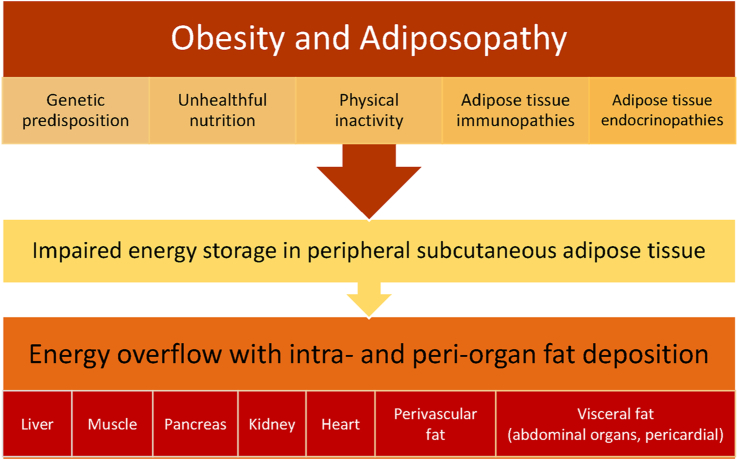Fig. 8.
Obesity, adiposopathy, energy overflow, and fat deposition within and around body organs. If during positive caloric balance, energy is stored in peripheral subcutaneous adipose tissue through unfettered adipocyte proliferation and differentiation, then while this may still result in biomechanical obesity complications described by “fat mass disease,” this may mitigate the adiposopathic “sick fat disease” immunopathies and endocrinopathies. However, if during positive caloric balance, either adipocyte proliferation or differentiation is impaired, then this may cause adipose tissue dysfunction (See Fig. 3) and limit energy storage in adipose tissue. This may result in immunopathies (See Fig. 4), endocrinopathies (See Fig. 6), and energy overflow with fat that may be deposited within and around body organs (i.e., fatty liver, fatty muscle, fatty heart), potentially resulting in “lipotoxicity” (See Fig. 3), depending on the susceptibility of the non-adipose tissue organ (See Fig. 7). The determination of energy (i.e., fat) storage distribution during positive caloric balance within the individual is dependent upon such factors as age [14], sex [14], race [14], genetics, medications (e.g., hormones, thiazolidinediones [98]), and concurrent illnesses (e.g., lipodystrophy). In general, among patients with overweight/pre-obesity and/or obesity undergoing weight reduction interventions, subcutaneous adipose tissue undergoes the greatest absolute amount of fat mass reduction through healthful nutrition, routine physical activity, anti-obesity medications, and bariatric surgery, largely because subcutaneous adipose tissue usually makes up most body fat (i.e., 90% or more). That said, the reduction of visceral adipose tissue correlates with reduction of subcutaneous adipose tissue, and the proportion of visceral fat reduction is often greater than subcutaneous fat reduction [99], with the degree of percent visceral fat reduction influenced by the same beforementioned factors that originally contributed to visceral fat accumulation.

